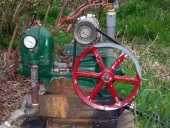Good discussion in this thread. My father installed and repaired water pumps for rural homesteads and farms of upstate NY for nearly 6 decades. Piston pumps operate at slower speeds than jets or turbines, so they tend to wear out slower. While modern jet pumps can be a worthwhile substitute, piston pumps have 3 major advantages over jets in some circumstances.
One is that if you get air in the intake line through cracks in the pipe or fittings, a jet or turbine pump won't perform, often cavitating while failing to build pressure. A piston pump can continue to work with a limited amount of air, albeit slower and with less pressure, continuing to provide water to humans, crops, and livestock.
Second, if you suck in grit or sand into a jet or turbine pump, it can often scour the metal in raceways, bearings, and seals to quickly render the pump useless. Piston pumps can handle a limited amount of grit, and the leather cups and packing around the stroke rod of a piston pump can be replaced comparatively easily with simple tools and materials (as others have described).
Third, if you lose electricity for prolonged periods in a disaster, you can use a generator to run any pump, but the flywheel on a piston pump can also be easily adapted to a gasoline motor if your generator fails. My father noted that he even saw clever people who rigged a hand crank shaft from the outer rim of the flywheel to use manual labor in a pinch to provide flow at pressure to a household or livestock until a better source of power could be obtained. Running a piston pump by hand will be a humbling lesson in water conservation

.



 .
.